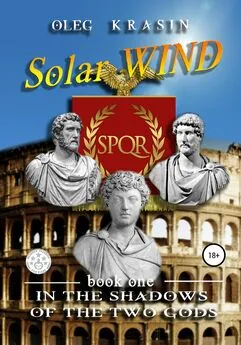Oleg Krasin - Solar Wind. Book one
- Название:Solar Wind. Book one
- Автор:
- Жанр:
- Издательство:неизвестно
- Год:2022
- ISBN:нет данных
- Рейтинг:
- Избранное:Добавить в избранное
-
Отзывы:
-
Ваша оценка:
Oleg Krasin - Solar Wind. Book one краткое содержание
MARCUS AURELIUS ANTONINUS
The emperor-philosopher, for a moment, thanks to him, the world was governed by the best and greatest man of his age.
Solar Wind. Book one - читать онлайн бесплатно ознакомительный отрывок
Интервал:
Закладка:
“Haven't you decided on a successor yet?” Servianus decided to clarify cautiously. “I heard about the young Marcus Annius. His great-grandfather, Annius Verus, a famous man, was, like me, a three-time consul. Of course, Marcus is a worthy candidate…”
Hadrian covered his purple toga harder, fearing that the interlocutor would see blood stains somewhere. Narcissistic, insidious, charming, intelligent, and artistic—he possessed all the qualities to become great. Life often seemed to him a game, a funny charade, which could be thrown to the opponent. Then step aside and watch him decide it.
He recently planted such a riddle on the young Marcus Verus, about which Servianus spoke. He sent young slaves to him and watched from the shelter. The young man's behavior, frankly, caused him different, contradictory thoughts.
Marcus was steadfast before the temptation, he did not give up, and if not for the betrayal of the body, perhaps, would have handled himself. But still, Augustus, the highest person of the state, must fully own his emotions. The emperor can't scream when it hurts terribly, can't cry when sad. Caesar must be like him, Hadrian, who harbored the pain of the loss of Antinous and did not show it.
He, Hadrian, knew that a lot of his opponents from the Senate and ordinary onlookers would enjoy his torment. They wanted revenge, they wanted satisfaction, because they were forced to obey orders that may seem unfair and cruel. But what did the crowd know? What did the Roman people know, mired in pleasure? And how not to enjoy the grief of Caesar, who brought grief down on the heads of others?
They did not understand that he was causing suffering not out of the whim of a capricious ruler, such as Domitian or Caligula. His steady hand expressed the will of the state, the cruel necessity that saved everyone in the end.
“But we haven't sat down yet. Please!” Hadrian invited Servianus to get down on his elbow, as they put it when they offered to lie on the bed. “I think it's sigma 27 27 Sigma – a bed in the form of a Greek letter ∑.
will be convenient. So, about Marcus. Yes, you're right, I difference him. But fame and nobility are not evidence that the boy will cope. The stars who patronize Rome suggest something else.”
“Who do you mean, great Caesar?”
Servianus's massive face froze. He decided that he would now hear the great mystery of the emperor Hadrian's plans, of which he had never spoken to anyone, would take shape.
The thoughts that hit Servianus made him nervous.
He, a well-known senator, was a close relative of the emperor, and the choice could fall on him. His grandson, Gnaeus Pedanius Fuscus, could also be a worthy successor, as Marcus was still young, he had a fragile soul. In addition, Pedanius was the only male offspring, in one way or another associated with the family of Hadrian.
After all, who was Marcus? Just a distant relative of Empress Sabina, in the intricacies of kinship, no one could understand. And among other things, Servianus was informed by close friends as at one of the feasts in a narrow circle, Hadrian asked about possible successors, asking to identify ten suitable candidates. But at the same time, Caesar made an important remark—he offered to name only nine out of ten, for the name of the tenth is known to him. This was Lucius Servianus.
Just like that! The emperor chose him! Of course, time had passed and he, Lucius Julius Urs Servianus, was not ready to shoulder the heavy burden of managing a huge empire. But here's Pedanius! He could.
The large, meaty face of Lucius Servianus turned red with excitement.
Hadrian took a cup of wine from the slave, drank, turned his eyes to the interlocutor. It was as if he was playing with the consul in games known to him.
“I'm thinking about your grandson,” Hadrian said. “He is young, but he has already shown himself on the good side. Not held large positions to hone the skill of management, but this case is fixable. What do you think, Lucius?”
“I fully approve of your choice, great emperor! Totally! My grandson and your nephew, the best candidate when it comes to successor. But we all hope to see you for more than one year. The gods will send you longevity!”
“Thank you!” Hadrian nodded with satisfaction. “Tell your nephew that I'm always happy to see him here in Tibur. Let Pedanius come without ceremony, as a person close to me. We will have something to talk about, walking in a graceful shadow. So,” he continued, changing the subject, “what do they say about me in Rome?”
“Everyone's talking about your recent joke, Caesar.”
“Which one? I have a lot of them. Did you know that I published my poems on behalf of Flegont freedman? The whole of Rome admired the former slave, and it was me, Emperor Hadrian. Of course, there were also scolds, I think, envious. I remember them. Then I had to tell the public about the real author.”
“I imagine the face of the critics,” Servianus gushed. “No, Caesar, I haven't read your poems. Unfortunately, I have little interest in literature.”
“It would be necessary!” discontentedly indicated Hadrian to the ninety-year-old interlocutor. “So, what's the joke?”
“They say that a supplicant, old and gray-haired, came to you, begging for tax relief because of crop failure, and you refused him. Then he dyed his hair…”
“I remember,” Hadrian smiled.
“Yes, he dyed his hair red and, thinking that it would be unrecognizable, reappeared. But you said you'd turned him down before.”
“Yes, yes, it's a nice joke!”
Servianus switched to a business tone.
“Caesar, a few senators are venerable and honored men I have known for a long time who want to take water from the aqueduct to their new homes. This requires the permission of the prefect, but Regin poses them all sorts of obstacles.”
Hadrian's eyes covered themselves, as if from exhaustion. He was bored. He did not like such economic disputes, where everyone fought for their benefit, everyone had a strong argument for winning the dispute. Only sufficient arguments or motive to choose someone’s side he did not have. Today, he was not like his other predecessors, whose main motive was wives and lovers, or the pursuit of pleasures. Or money, like emperor Vespasian.
He had nothing left! Just boredom. Anything that could have prompted him to choose one side or the other had gone irretrievably and nothing else was interesting. It was as if part of the soul had died with Antinous's death. And maybe the whole soul?
“Servianus,” he interrupted the old consul, “I always support the law, and the Senate is our only interpreter. As it decides, so it should be executed.”
The old consul, who listened carefully to the emperor, began to ponder who from the Senate could be relied upon to assist with this sensitive issue, as Regin also had strong support among senators. Alas, it would be difficult to win without Hadrian's direct!
“I don't care much about these issues, dear Lucius,” Hadrian continued. “I need a huge scale. I am attracted to something new, grandiose, unprecedented, like the singing colossus of Memnon in Egypt, or the temple of Athena Pallas in Greece. That's why I planned to build my tomb in such a size and in such a way that no emperor has ever built before. I have always said, better movement than contemplation, better life than sleep. Do you realize Servianus, who is the greatest emperor in the history of Rome?”
“Of course, you, Caesar. There's no doubt about that!”
Playing trigon
After Diognetus and Andron, Marcus's training did not stall, but on the contrary, was continued by Regin with all the diligence and consistency inherent in the Romans. However, after thinking about it, Marcus's great-grandfather decided to make some changes.
Until now, the grandson studied alone, which was useful—the teacher could pay attention only to one student and only teach him and educate him. But on the other hand, such artificial isolation led to the isolation of the young man from his peers, and this, in turn, could influence the character of the future senator and consul—above Regin did not look. In addition, Marcus should have instilled an adversarial spirit from a young age.
Therefore, in order to keep company, Marcus invited a few more young men from well-known families, two from senators and from riders.
Today, they played trigon.
Although this game seemed simple and straightforward, many famous people fought in it, for example, the philosopher Seneca, art lover Maecenas, and even the emperors Caesar and Octavian Augustus. Marcus led his friends to the peristyle, 28 28 Peristyle (Greek) garden, surrounded on four sides covered with colonnade.
surrounded by porticos, where slaves in a vacant space had already drawn a triangle. The rules required three men to stand in the corners and quickly throw the ball at each other. At the same time, it was necessary to grab it with one hand equally well, both right and left, and then, slung in the other hand, to send to the opponent. Those who could not manage it, who dropped the ball to the ground, were called pejoratives such as savage or yokel.
Marcus played with Gaius Victorinus and Seius Fusсianus. Baebius Longus counted the dropped balls, and the fourth—Kalen, with them was not.
Cheerful and carefree, they laughed loudly, shouted, and argued. Sweat appeared on their faces, hands, bodies, and dark spots appeared on white tunics. Despite the approaching autumn, hot weather had just recently been established, which was not surprising for Rome, where warm days could last until November.
The slaves standing nearby gave the young men towels to wipe, and they had to stop the game for a while. Marcus knew his opponents well—Victorinus and Fuscianus. Both were from the Nobilis, whose ancestors repeatedly sat in the curule chair, became consuls and praetors and censors. Both lived on the Caelian Hill, not far from him.
The game was tenacious, protracted.
Fusсianus did not pose any threat to Marcus. Dense physique, clumsy, slow, he threw the ball in the direction of Marcus not as quickly as Victorinus, and catching it was not difficult. But despite his slowness, Fuscianus himself still successfully handled catching the balls launched in his direction by Marcus or Gaius Victorinus.
Of course, the great danger in the game was Victorinus. He had a quick reaction, mobility, as a bird sharply turned his head from side to side. He was an experienced opponent. But as happens even with such strong players, Gaius had a weakness, which Marcus noticed during the game—he was inattentive, carried away, and this inattention failed him.
“He's going to quit now!” thought Marcus, as Gaius led his eyes in his direction. The Victorinus did not know how to watch the face in such tense moments, which was very important. It's like a game of nuts that Marcus once watched by slaves, one hiding a few nuts in his fist, trying to keep his face unflappable, while others tried to guess their number. Showy indifference was one of the keys to success in that game. But not only that. As Marcus noted, composure often helped to prevail in other games. And if in games, why not in life?
Victorinus threw the ball in the direction of Marcus and he caught it, but at the same time Fuscianus threw to him and Gaius could not react quickly. The ball fell to the ground, rolled to the feet of Baebius Longus.
“Dropped it, dropped it!” Longus shouted. “How embarrassing you are, Gaius! A yokel! Missed so many goals!”
Indeed, Gaius was much inferior to Marcus and Seius in the number of goals conceded. He reminded Marcus of a crow, the same black hair, the same choppy bird movements. Tall and wiry, Gaius had small eyes close to his nose and a large nose that looked like a curved beak. Perhaps he should have been born among the family of Valerius, one of which was nicknamed Raven.
Читать дальшеИнтервал:
Закладка:










